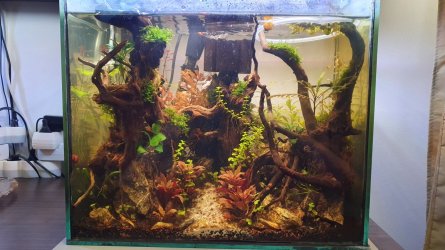I have never been a fan of DIY CO@ for a number of reasons. At the higest count I had 13 planted tanks and only one was a high tech tank where I used pressurized CO2. I had planned to start with DIY to make sure I would benefit before I spent for the pressurized, Back in 2002 before most social media we did things on sites like this one and chat rooms connected to them.
One of the best pieces of advice I got back then was from a few of the plant experts in the chat. Iwas told, if I could addord it, to start with pressured and not "waste my time" with DIY. My high tech planted tank was a 50 gal. I ran it for 9 years before it cam down and I solf off the CO2 system. That tank took too much time to maintain. The plants grew very rapidly and major pruning which for stems meant, uproot. cut in half and replant the top. For the baby tears about avery 6 or 7 weeks I had to remove a huge mat that was lifiting off of the substrate and replant from scratch (i.e. I threw out over 95% of the plants and replant the rest).
On the other hand I have used Flourish Excel in all my other planted tanks. I add it only once a week and only at the recommended dosage. Some folks will never use this product as they believe it is not safe for the fish. I have used it for a very long time and have never seen any evidence of this. My fish are not deformed, they reproduce and also seem to live longer than average. I do know Excel is not CO@ and can not provide the benefits need where the CO@ in aquarium water can be used faster than it can be replaced by just roiling the surface of the water in the tank.
So I do not agree with the view that one should not use these products, but I respect those who prefer not to use them. I understand the thinking, but I cannot prove they are correct in this. Nor can I find scientific evidence that supports using Excel as being harmful for use in a tank. I do check the literature now and then just to see if somebody finally did some lab grade research RE Excel or and similar product.
However, I did find a paper on DIY CO2. It is not the typical research paper and I did not read it, but it looked interesting.
LeVasseur, J., A Treatise on DIY CO2 Systems for Freshwater-Planted Aquaria.
This article will attempt to cover all aspects of DIY CO2 systems used on freshwater-planted aquaria. Insights into the needs of aquatic plants in relation to CO2, and how this relates to CO2 injection methods, will be described. It will examine mechanical designs, and the biology of yeast relating to its ability and conditions by which it produces carbon dioxide. Formulas for yeast mixtures and some details on construction projects will also be provided.
http://www.diendancacanh.com/book/Plant/DIY_CO2_System_John_LeVasseur.pdf


